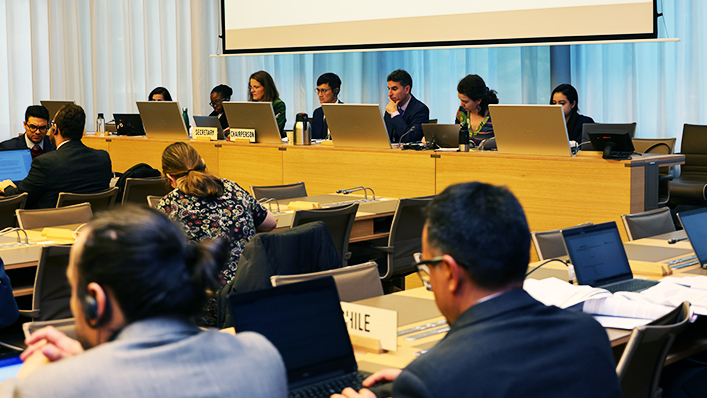
Agreement on the proposed process follows the adoption on 17 June of the SPS Ministerial Declaration on new challenges affecting food safety and animal and plant health. The Declaration mandates the SPS Committee to set out a work programme and to report on its key findings, actions and recommendations to the 13th Ministerial Conference (MC13), scheduled to be held between December 2023 and March 2024.
Over the past few weeks, five thematic groups held the first discussions on the themes outlined in the SPS Declaration. These groups were led by stewards who played the role of neutral facilitators in the discussion.
Themes identified included how to facilitate global food security and more sustainable food systems, how to support basing SPS measures on scientific evidence and principles and how to enhance safe, international trade in food, animals, plants and related products through the adaptation of SPS measures to regional conditions. Other themes include how to encourage cooperation with observer organizations and how to increase participation of developing and least developed country (LDC) members in the development and application of SPS measures while ensuring support for their special needs.
The thematic groups will regularly report to the full membership on ongoing discussions, with reports at intersessional consultations – the first one was held on 4 October – and at informal Committee meetings.
The proposed process is detailed in document G/SPS/W/330/Rev.1. In addition, members were invited to consider the possibility of dedicated thematic sessions, workshops, webinars or additional specific discussions on particular topics. The WTO Secretariat has created a dedicated, restricted webpage (wto.org/spsdeclaration) for members to track information, including meeting times and links for the thematic groups.
Specific trade concerns
Members raised 52 specific trade concerns (STCs), 10 of them for the first time in this Committee. A wide range of issues were discussed, including on pesticide maximum residue levels (MRLs), animal diseases and COVID-19 related measures.
New STCs addressed issues such as meat import restrictions and procedures, sanitary certification requirements for aquatic animals food, regulations on animal health certificates for animal origin foods, food safety and standards, and vitamin D3 regulations.
Several previously raised STCs covered pesticide tolerances and the environment, legislation for endocrine disruptors and veterinary medicinal products, collagen for human consumption, and phytosanitary certification requirements. Several delegations reiterated their concern regarding China’s actions related to COVID-19 that in their view affect trade in food and agricultural products.
The Secretariat shared an update on the status of STCs that had not been discussed since the SPS Committee meeting in November 2020, following similar exercises undertaken in 2013, 2017 and 2020. A total of 37 members were requested to provide information. Eighteen of them have indicated that, of the 221 concerns for which no resolution had been reported, 31 concerns were considered resolved and 14 were considered partially resolved.
The results were circulated in document G/SPS/GEN/2062/Rev.1, which also contains the results of the 2020, 2017 and 2013 exercises.
In total, of the 548 concerns discussed by members since 1995 (without taking into account new concerns raised for the first time at this meeting), more than 57% of the total concerns raised in the Committee are considered to be resolved or partially resolved.
Information on the reported status of STCs is available in the Trade Concerns Database.
Thematic sessions
Members participated on 8 November in a Thematic Session on International Standards and Best Practices in Pest Risk Identification, Assessment, and Management. The purpose of the session was to increase awareness about the relevant International Standards for Phytosanitary Measures (ISPMs) of the International Plant Protection Convention (IPPC) and the sharing of experiences by members and industry representatives.
The session also sought to identify best practices and challenges associated with issues such as identification of pests of phytosanitary concern, performance of pest risk analyses, risk mitigation measures, phytosanitary certification and/or import conditions, and IPPC standards on risk management.
The chair of the Committee, Mr Tang-Kai Wang of Chinese Taipei, said the session had proven to be interesting and informative. It had provided insights into relevant international standards as well as the challenges, opportunities and best practices in pest risk identification, assessment and management, he added. Presentations from the session are available on the SPS TA Gateway.
Following a Thematic Session on Trade Facilitative Approaches to Pesticide MRLs held in March 2022, Australia, Colombia, Paraguay and the United States submitted a proposal for further work, which was subsequently co-sponsored by Japan and Uruguay (GEN/2034/Rev.1).
Co-sponsors provided an update, underscoring the importance of international harmonization of MRLs to Codex Alimentarius standards for several sectors and noting that this particular issue had been discussed in various fora for several years.
They noted that addressing this issue had become increasingly difficult and underscored the need to approach the issue in a more focused manner, recognizing the importance of transparent, science-based measures which take into account Codex MRLs.
However, taking into account the MC12 SPS Declaration work programme and the current workload of the Committee, co-sponsors said it was not the ideal time to propose the creation of a working group. They suggested it might be more feasible to undertake this work later in 2023.
Looking forward, the United States submitted a proposal (G/SPS/GEN/2067) for a thematic session on SPS risk communication, with an emphasis on public perceptions of issues concerning food, technology, health and the environment. The US explained that regulators around the world were increasingly exposed to information from a multitude of sources, some of which may not be science or risk-based and did not contribute to the development of justified SPS measures.
Members were generally supportive of this initiative, which the United States did not anticipate to take place before November 2023.
Next meeting
The next meeting of the Committee is tentatively scheduled for the week of 20 March 2023.
Share
Reach us to explore global export and import deals